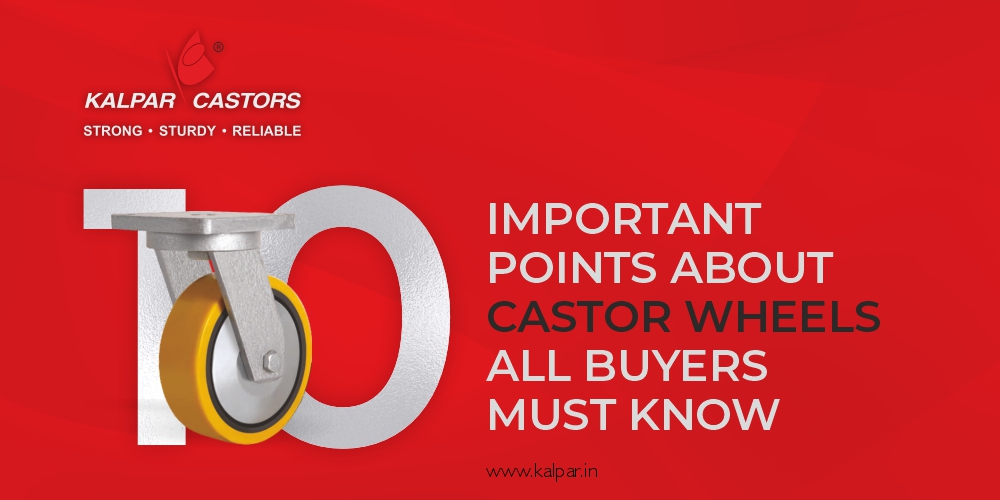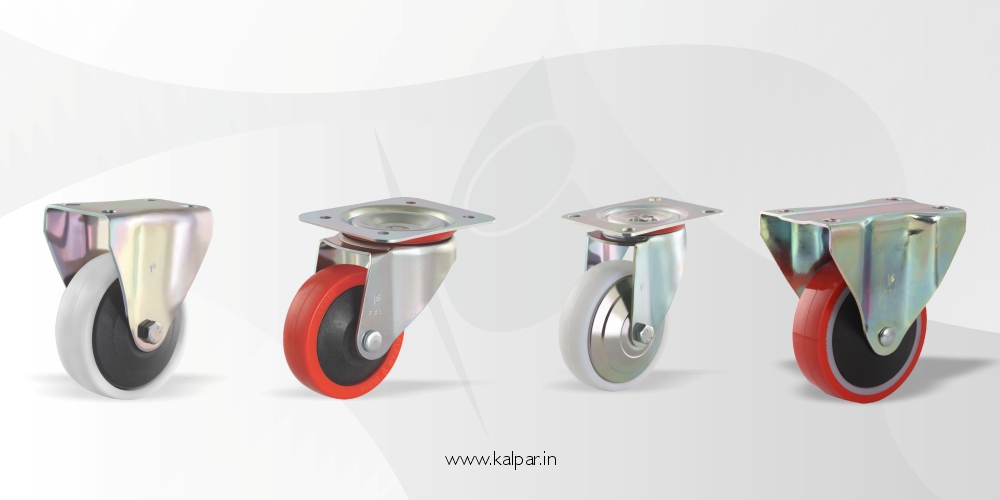10 Important Points About Castor Wheels All Buyers Must Know

When it comes to selecting the right castor wheels, understanding their features, functionality, and application is critical. Whether you need castors for industrial trolleys, medical equipment, or office chairs, choosing the right one ensures efficiency and durability.
Here are 10 key points all buyers must consider when purchasing castor wheels:
- Load Capacity
One of the most crucial factors is the load capacity of the castor wheels. Overloading can lead to premature wear or failure. For example:
- Light-duty castors are ideal for office chairs.
- Heavy-duty castors are essential for industrial trolleys handling large machinery above 100 kgs.
- Wheel Diameter
The diameter of a castor wheel significantly affects its performance. Larger wheels roll more smoothly over uneven surfaces and require less effort to move heavy loads. They are ideal for rough terrains or heavy-duty applications, whereas smaller wheels are suited for lighter loads and smooth, flat surfaces. Selecting the right diameter ensures operational efficiency and reduces strain during movement.
At Kalpar Castors we have a wide range starting from 22 mm to over 200 mm diameter in size.
- Material Matters
Castor wheels are made from a variety of materials, each suited for specific applications. Choosing the right material ensures durability, floor protection, and operational efficiency:
- Polypropylene (PP): Lightweight, durable, and economical, ideal for light to medium loads on smooth surfaces.
- Polyurethane (PU): Highly durable and abrasion-resistant, perfect for industrial applications where heavy loads and frequent movement are common.
- Nylon: Strong and wear-resistant, ideal for high-load capacities and harsh conditions like manufacturing plants and warehouses.
- Thermoplastic Elastomer (TPE): Combines durability with floor protection and noise reduction, making it suitable for sensitive areas like hospitals and offices.
Selecting the right material ensures your castor wheels deliver optimal performance and longevity.
- Surface Compatibility
The type of floor determines which castor you should choose:
- Hard floors: Opt for softer wheels like rubber to prevent marking.
- Industrial floors: Use hard wheels like nylon or PU for easy rolling.
- Uneven or outdoor surfaces require pneumatic or spring-loaded castors for stability.

- Fixed vs. Swivel Castors
Understand the difference:
- Fixed castors allow straight-line movement.
- Swivel castors enable easy directional changes, making them ideal for tight spaces like warehouses or medical facilities.For increased maneuverability, many setups use a combination of both.
- Brake and Locking Mechanisms
For safety, castors with brakes or central locking systems are vital. For instance, Kalpar’s Central Lock Castors ensure stability in medical furniture like hospital beds, preventing unwanted movement.
- Ergonomics
Reducing user fatigue is key. Ergonomically designed castor wheels, like spring-loaded castors, absorb shocks and vibrations, minimizing the force required for movement. These are ideal for material handling in textile or warehouse environments.
- Noise Levels
In noise-sensitive areas, such as hospitals or offices, choose castors with noise-free operation. Nylon or polyurethane castors are excellent for smooth, quiet rolling.
- Durability and Maintenance
Invest in high-quality castors that require minimal maintenance. Kalpar’s Powder Coated Castors and Stainless Steel Castors are an example of durable options that resist wear and tear, extending the life of the product and reducing costs.
- Customization Options
Every industry has unique needs. Look for manufacturers offering customizable castors. Kalpar Castors provides tailored solutions for industries like air cargo, automotive, healthcare, Textile and many more.
- Environmental Impact
Sustainability matters. Opt for castor wheels with recyclable components or those designed to minimize waste, such as quick-change wheels that allow replacing only the damaged part instead of the whole unit.Choosing the right castor wheels is essential for operational efficiency, safety, and cost-effectiveness. Consider factors like load capacity, material, ergonomics, and surface compatibility before making a decision. Whether you’re in healthcare, industrial manufacturing, or logistics, understanding these points will help you select castor wheels that deliver optimal performance.For durable, reliable, and customisable castor wheels, check out range of Kalpar Castors. Explore our wide range today and make every move smooth and efficient!
